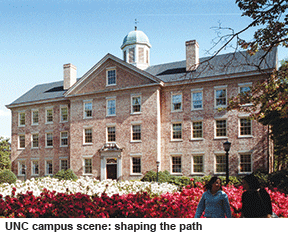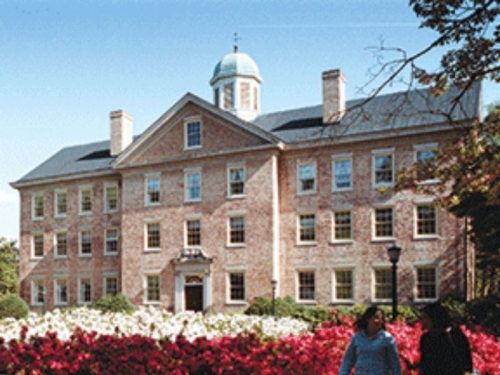University of North Carolina, Chapel Hill
Ranked among the world’s Top 50 universities worldwide by THE, America’s first public varsity, University of North Carolina, Chapel Hill has built itself an excellent transnational reputation SUMMIYA YASMEEN
 Chartered in 1789 as America’s first public varsity, over the past 226 years the University of North Carolina, Chapel Hill (UNC) has built itself an excellent transnational reputation for teaching and research. Currently, University of North Carolina, Chapel Hill which admitted its first batch of students in 1795, is ranked among America’s Top 30 varsities by the US News and World Report and #47 worldwide by the London-based Times Higher Education in its World University Rankings 2013-14. A member of the prestigious Association of American Universities, UNC is credited with producing the largest number of Rhodes Scholars among public varsities (49 since 1904).
Chartered in 1789 as America’s first public varsity, over the past 226 years the University of North Carolina, Chapel Hill (UNC) has built itself an excellent transnational reputation for teaching and research. Currently, University of North Carolina, Chapel Hill which admitted its first batch of students in 1795, is ranked among America’s Top 30 varsities by the US News and World Report and #47 worldwide by the London-based Times Higher Education in its World University Rankings 2013-14. A member of the prestigious Association of American Universities, UNC is credited with producing the largest number of Rhodes Scholars among public varsities (49 since 1904).
Currently, University of North Carolina, Chapel Hill offers its 29,000 undergraduate, graduate and professional students, 78 bachelor’s, 112 Masters, 68 doctorate and seven professional degree programmes through its 14 schools and the College of Arts and Sciences. All undergraduates receive a liberal arts degree but have the option to pursue a major within the professional schools or the College of Arts and Sciences.
“I believe Carolina can be the leader in shaping the path for the public universities of America. By preserving excellence and innovation, access and affordability, and a deep commitment to the state, we have developed the strength to innovate and meet new challenges,” says Carol Folt, chancellor of UNC, a constituent of the University of North Carolina system, a multi-campus public institution comprising 16 public universities spread across the state.
Chapel Hill. Sited in Orange County in the south-eastern state of North Carolina, Chapel Hill (pop. 57,000) offers students the advantages of a small town environment combined with urban-style living. In 2014, the personal finance website wallethub.com ranked Chapel Hill as the #3 college town of America. In addition to UNC, the flagship institution of the North Carolina university system, Chapel Hill boasts numerous local farms, forums for the arts, a historic district, museum, library, parks, malls, and numerous recreational facilities. Public transportation is free of charge, and connects the campus with other parts of the town and the nearby cities of Durham and Raleigh.
Chapel Hill offers a temperate climate with hot and humid summers followed by mellow autumns, and cool winters with occasional snowfall. The buzzing metros of Atlanta, Georgia, and Washington, DC are a mere four-five hours drive down America’s superb highways.
Campus facilities. UNC’s sprawling 729-acre campus hosts 300 major buildings, giant oak trees, brick sidewalks, stone paths and expansive greenery. The campus is dominated by two central quads: Polk Place and McCorkle Place. Adjacent to Polk Place is a sunken brick courtyard known as the Pit where students gather, to often engage in lively debate. In 1999, the UNC campus was conferred the American Society of Landscape Architects Medallion award.
The university’s library system comprises the Davis Library, the central collection for humanities, social science, and business research; the Wilson Special Collections Library which houses rare and unique materials, and the R.B. House Undergraduate, Health Sciences and Law, the Kenan Science and specialised subject libraries. Together, they offer students over 7 million print volumes.
In consonance with established tradition in US higher education, sports facilities are extensive with UNC teams competing in 28 varsity sports. Recreational and athletic facilities include an olympic-size pool, the Tom Fazio-designed Finley golf course, numerous tennis, squash, badminton, volleyball and basketball courts, playing fields, fitness centres and gymnasiums, mountain bike trails, climbing walls, and a tartan-surfaced athletics track.
Moreover, 700 student organisations offer music, the performing arts, journalism, creative writing, student government, politics, and international cultures, among other clubs and societies.
Admission. Admission into UNC’s undergraduate programmes is highly competitive with students assessed for academic performance and extra-curricular achievements. In 2014, of the 31,331 students who applied only 3,974 were admitted. The minimum eligibility requirements for admission into the four-year undergraduate programme are successful completion of Plus Two, above average grades in SAT/ACT with high writing test scores. In addition, international students must submit proof of proficiency in English — TOEFL (minimum score: 100); IELTS (7) or PTE (68) scores are acceptable.
The common admission application form must be submitted online (www.unc.edu) with a fee of $80 before January 12 for admission into the term beginning September. Supporting documents required include transcripts of secondary exam scores, SAT/TOEFL scores, two essays and letter of recommendation.
For further information, contact Office of Undergraduate Admissions, University of North Carolina at Chapel Hill, Jackson Hall, 153-A, Country Club Road, Chapel Hill, NC 27514. Ph: +1 919-966-3621; fax: +1 919 962-3045; e-mail: [email protected]; website: www.unc.edu.
Accommodation. UNC provides on-campus housing to over 8,500 students in 32 halls of residence divided into 13 residential communities. Accommodation options vary from dormitory to apartment-style residences with all halls of residence offering wi-fi internet access, lounge, kitchen, and laundry facilities. For those who prefer off-campus accommodation, the office of housing and residence education offers help and advice.
Degree programmes. The university’s 14 schools and College of Arts and Sciences offer a wide menu of undergrad, postgrad and doctoral programmes (see box).
| SCHOLASTIC OPTIONS AT UNC CHAPEL HILL
The university’s College of Arts and Sciences and 14 schools — education, dentistry, law, medicine, nursing, social work, journalism and mass communication, government, information & library science, Eshelman School of Pharmacy, Gillings School of Global Public Health, Graduate School, Kenan-Flagler Business School — offer a wide range of undergraduate, postgraduate and doctoral programmes. They include: American Indian studies, applied sciences & engineering, archaeology, bioinformatics & computational biology training, biological & biomedical sciences, business (undergraduate), Christianity & culture, cinema, cognitive science, comparative literature, communication studies, creative writing, cultural studies, developmental biology training, ethnicity, culture & health outcomes, environment & ecology, European studies, folklore, genetics & molecular biology, global studies, humanities & human values, Institute for Environment, Jewish studies, Latin American studies, management & society, mathematical decision sciences, mathematical sciences, medieval & early modern studies, Middle East/Muslim civilizations, molecular biology & biotechnology, molecular/cellular biophysics, neurobiology, peace, war & defence, philosophy, politics & economics, public administration, public health leadership, Russian/East European studies, sexuality studies, social & economic justice, toxicology, writing for screen & stage |
















Add comment